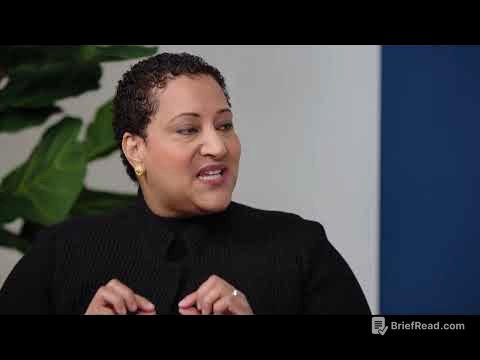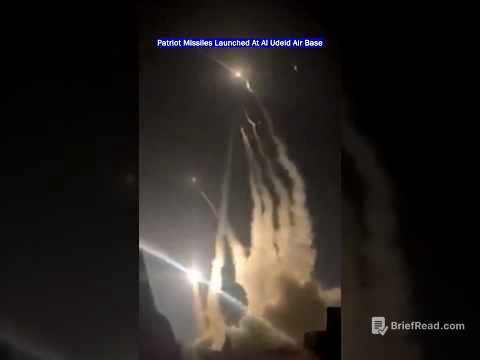TLDR;
This video explores the Quran's perspective on calamities, drawing parallels between the sins of past nations and contemporary issues. It emphasizes that while God promised not to destroy the current ummah collectively, He uses trials and tribulations to warn, test, and encourage repentance. The importance of understanding the metaphysical aspects of disasters, alongside their natural causes, is highlighted, as well as the necessity of prayer, seeking forgiveness, and self-reflection in facing adversity.
- The Quran tells stories of past nations destroyed for denying truths and rejecting prophets.
- God uses calamities to warn, test, and encourage repentance in the current ummah.
- Understanding both the physical and metaphysical aspects of disasters is crucial.
- Prayer, seeking forgiveness, and self-reflection are essential in facing adversity.
Introduction [0:00]
The video begins by stating that the Quran contains numerous verses that recount the stories of past nations, their sins, their struggles with prophets, and their ultimate destruction. A common characteristic among these destroyed nations was their denial of divine truths, their rejection of prophetic messages, and their refusal to acknowledge their mistakes, sins, and injustices. Each nation exhibited unique traits of denial and extremes in certain sins.
Sins of Past Nations [1:06]
The video references the sins of past nations, such as the people of Prophet Noah, who worshipped idols, and the people of Prophet Hud, who were deceived by their strength and challenged the self. The people of Hazrat Salih did not believe in miracles or accept divine will, while the people of Hazrat Lut engaged in immorality. These nations faced mass destruction for their disbelief and misguidance.
Calamities in the Modern World [2:17]
The video transitions to the modern world, observing that all the sins and evils of past peoples are being committed today. However, it notes that God has promised not to destroy the ummah of the end times collectively through means like floods or storms. Instead, God inflicts troubles and calamities to punish tyrants, warn believers, and offer hope to the oppressed. While the ultimate punishment for denying Allah is in the hereafter, Allah may punish oppressors in this world to comfort and encourage His servants.
Divine Forbearance and Human Sins [4:09]
The speaker expresses astonishment at God's forbearance in the face of widespread disbelief, oppression, and sin. The indecency of the people of Lut is now committed daily, and basic human rights are violated. Some criticize the Prophet, interfere with the Quran, and even worship Satan. Many wish for divine punishment, but God's judgment is perfect and wise, giving time and opportunities before warning and punishing.
Metaphysical Perspective on Disasters [5:58]
The video emphasizes the importance of viewing disasters from a metaphysical perspective. While events like tsunamis, droughts, and earthquakes have natural causes, explaining them solely through natural causes is incomplete. It is necessary to consider the spiritual causes and wisdom behind these events. Believing in Allah's absolute control over the universe means acknowledging that events occur according to His will.
Calamities as a Slap of Compassion [7:34]
Calamities are sometimes sent as a "Slap of Compassion" to warn and admonish servants, indicating they are on the wrong path. They can also punish those who forget Allah or prompt unity and solidarity among people, reviving compassion and gratitude. Disasters can change perspectives and encourage people to rethink their lives.
Repentance and Self-Reflection [8:51]
Believers should seek to understand the divine wisdom behind calamities and turn to God with repentance. Troubles often result from sins, rebellions, and oppression. While God punishes those who play a role in evil, general punishments affect everyone, though each person is treated according to their position in the afterlife. Calamities cleanse the sins of the innocent and oppressed, increasing their status in the hereafter.
Mercy and Wrath [10:22]
Rain, as a symbol of God's mercy, can transform into wrath when it encounters human sins, causing floods. Droughts occur when God's mercy is withheld. In such situations, believers should turn to God with repentance, begging for forgiveness. The speaker references stories of Prophet Moses and Prophet Omar, who prayed for their communities during times of drought and famine.
Personal Accountability and Prayer [13:14]
The video stresses the importance of personal accountability in the face of troubles. Individuals should examine their mistakes, repent, and return to God. Divine warnings will continue until people escape their heedlessness. Prayer is not limited to times of trouble but should be interspersed throughout life. Expressing helplessness and seeking refuge in God's strength can serve as a lightning rod against calamities.
Conclusion: Meeting Disasters with Prayer [14:59]
The video concludes by encouraging believers to remain free towards people but reveal their helplessness and need before God. Meeting celestial and earthly disasters with prayer creates shelters and shields against harm.



![첫 회부터 전채널 1위하며 시청률 15.5%찍은 술 제조 명가 재벌집 충격적 스토리를 다뤄 화제인 [독수리 5형제를 부탁해!]](https://wm-img.halpindev.com/p-briefread_c-10_b-10/urlb/aHR0cDovL2ltZy55b3V0dWJlLmNvbS92aS9hNG8yV2l3Z01Ddy9ocWRlZmF1bHQuanBn.jpg)





